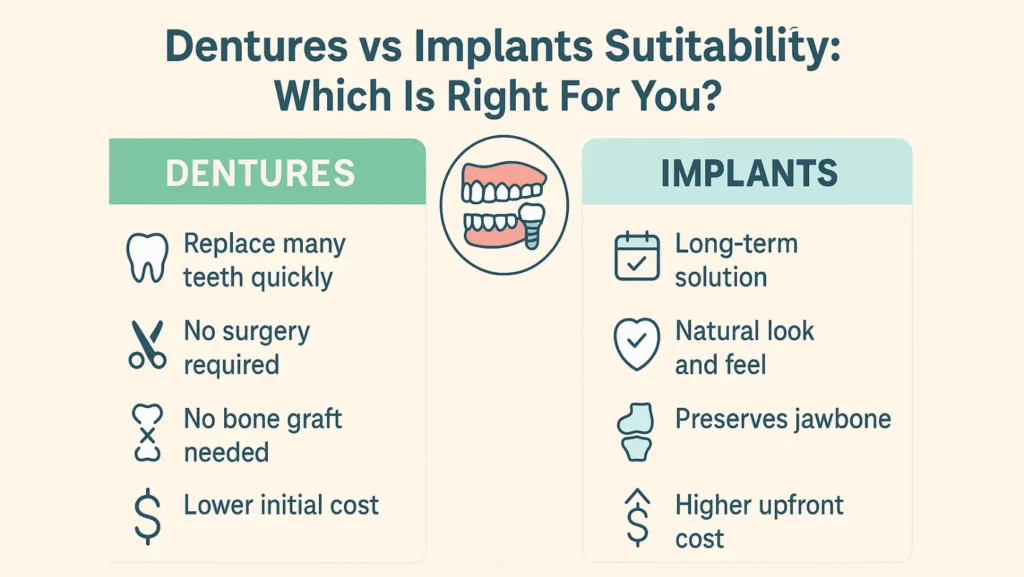Dentures and implants both replace missing teeth. Dentures are removable replacements that sit on your gums. Implants are metal posts placed into your jaw that hold crowns or dentures in place.
Table of Contents
ToggleYou can choose either based on health, budget, and goals. This guide gives clear facts. You get direct answers and simple steps to decide.
What’s the Difference Between Dentures and Implants?
The main difference between dentures and implants is how they attach. Dentures sit on your gums, and you remove them. Implants are metal posts placed into your jawbone. A crown or denture then attaches to the post.
Dentures replace many teeth without surgery. Implants replace single teeth or whole arches with surgical support. You will feel and use them differently. Your jaw also responds differently.
Dentures may speed bone loss. Implants keep bone healthy by sending chewing force into it.
How Each Works: Removable Dentures Vs Surgically Fixed Implants
Your dentist fits dentures after taking mouth molds. The base sits on soft tissue. You put them in daily and remove them each night. You clean them outside your mouth. You may use adhesive for extra hold.
For implants, your dentist places a titanium post into the bone. Bone grows around the post over months. This process gives a strong anchor. The dentist then adds an abutment. The abutment holds a crown or a bridge. You brush and floss implants like real teeth. Implants become part of your jaw. They act like natural tooth roots.
Materials And Structure Comparison
Dentures usually use acrylic for the base. Teeth on dentures are acrylic or porcelain. The base sits on gums and tissue. The structure is lightweight. It can chip or wear.
Implants use titanium posts. Crowns are made of ceramic or porcelain. The post bonds to bone. The crown matches the color and shape. The structure mimics a natural tooth. The result feels firmer under pressure.
Comfort, Appearance, And Maintenance Differences
New dentures may rub and cause sore spots. You may need several visits to adjust them. You will remove them to clean each night. You must rinse after meals. You must soak them when sleeping.
Implants feel like fixed teeth. They do not move in your mouth. You brush and floss them every day. You should visit your dentist for regular checks. Implants reduce speech issues caused by loose dentures. They give a natural bite and stable chewing.
Lifespan And Durability Analysis
A set of dentures may last five to eight years. Over time, the fit loosens. Bone and gum changes cause a loose fit. You will need relines or new dentures.
Implants can last many years. The titanium post may last a lifetime. The crown on top may wear and need replacement. Good home care improves implant life. Avoid heavy habits like chewing ice.
Dentures Vs Implants Suitability: Which Is Right For You?
Choice depends on you. Your health, bones, and budget guide the decision. You must know which option fits your life.
Factors To Consider — Bone Density, Gum Health, Age
For implants, strong bone is best. If you have low bone, grafting may help. Healthy gums reduce infection risk. Your overall health matters more than your age. Conditions that slow healing may affect implant success.
Who Should Consider Dentures?
Choose dentures if you need many teeth replaced quickly. Dentures fit patients with low bone without grafts. You may pick dentures if you prefer no surgery. Dentures suit those with limited funds for implants.
Who Should Choose Implants?
Pick implants if you want a long-term, stable solution. Implants suit people who want strong chewing and a natural feel. Implants help when you want to protect jawbone health over time.
Medical Conditions That Affect Your Suitability
Poorly controlled diabetes can slow healing. Smoking reduces blood flow and raises implant failure. Certain medications may affect bone healing. Your dentist will review your meds and health before you choose.
Implant-Supported Dentures Vs Traditional Dentures
You can combine both options for better results. This hybrid can lower costs and raise comfort.
What Are Implant-Supported Dentures?
Implant-supported dentures and traditional dentures use implants to hold a denture. The denture snaps onto posts or bars. This gives a much better hold than a regular denture. You can often remove the denture for cleaning.
How Implant-Supported Dentures Improve Stability
The implants stop the denture from slipping. You will chew more confidently. Speech improves because the denture stays put. You will feel fewer sore spots and less adhesive use.
Pros And Cons Of Traditional Removable Dentures
Traditional dentures cost less and avoid surgery. They work fast. They can slip while you eat or talk. Food restriction may follow. You will need relines and replacements.
Cost And Comfort Comparison: Implants Vs Implant-Supported Dentures
Full-arch implants cost more than implant-supported dentures. Using fewer implants to hold a denture cuts costs. Comfort improves compared to a removable denture alone. Ask your dentist for a plan that fits your budget and goals.
Dentures Vs Implants: Pros And Cons
You must compare both options with clear facts. This helps you understand what fits your needs without guesswork. Each choice gives benefits but also limits.
Pros Of Dentures — Affordability, Non-Invasive, Faster Restoration
Dentures cost much less at the start. You do not need surgery or a long healing time. You can get a full smile in weeks. Many people choose dentures when they want a fast fix for missing teeth. Dentures help you chew soft and medium foods. You can also adjust them if your mouth shape changes.
Cons Of Dentures — Limited Stability, Regular Replacements
Dentures can move when you eat or talk. You may need adhesive for a better grip. Bone loss under dentures can occur. This makes the fit loose. You will need new dentures every few years because the mouth changes with age. This adds long-term cost.
Pros Of Dental Implants — Durability, Natural Look, Bone Preservation
Implants act like real roots. They stay firm in the bone. You get a stable bite that lets you eat tougher foods. Implants help keep bone strong because chewing force signals the bone to stay healthy. Many people like implants because the crown looks like a natural tooth. The feel is close to a real tooth when chewing.
Cons Of Implants — Surgery, Cost, Healing Time
Implants need surgery. You must heal for months before the final crown goes on. The cost is higher at the start. Some people need bone grafts if bone is weak. Healing can take longer if you smoke or have health conditions. You need patience for the process.
Dental Implants Or Dentures: What To Choose for Your Needs?
You should look at your daily life and long-term goals. That guides the right choice. You do not pick based on price alone. You think about comfort, function, and health.
When To Choose Implants For Long-Term Oral Health
Choose implants when you want a fix that stays strong for years. Implants help protect bone. You will chew better. You will likely need fewer changes over time. If you want a natural feel and look, implants work well.
When Dentures May Be The Better Short-Term Solution
Pick dentures when you need a fast fix. Dentures work when the bone is too weak for implants. Dentures also help when you need an affordable start. You can upgrade later if you wish.
Hybrid Options — Combining Both For Comfort And Cost-Effectiveness
You may choose a denture that connects to a few implants. This mix gives stability without paying for a full set of implants. Many people use this option when they want a stronger bite without paying a higher full arch cost.
Expert Advice: Consulting Your Prosthodontist Or Oral Surgeon
Your dentist checks your bone, gums, and general health. They explain how many implants you may need. They show models and treatment plans. You should ask questions about healing, risks, and cost. A skilled dentist helps you make the best choice.
Procedure Comparison: How Dentures And Implants Are Done
Both treatments follow steps. Knowing the steps helps you prepare for visits and healing.
Step-by-Step Process For Denture Fitting
- Your dentist checks your mouth.
- They take molds of your gums.
- They create a trial denture for fit and shape.
- You try it and give feedback.
- The lab makes the final denture.
- Your dentist adjusts the denture until it feels right.
Step-by-Step Process For Implant Placement
- Your dentist checks the bone with scans.
- They place the titanium post into the bone under numbing.
- You heal as bone grows around the post.
- After healing, the dentist adds an abutment.
- A crown or denture attaches to the abutment.
- You get bite checks to ensure smooth chewing.
Healing Time, Adjustments, And Follow-Up Care
For dentures, you may feel sore at first. Your dentist adjusts pressure spots. For implants, healing can take months. You must keep the area clean. You must return for checks. Follow-up care helps prevent infection.
Longevity And Maintenance Requirements
Dentures need daily cleaning. You must soak them at night. You need relines as gums shift. Implants need brushing and flossing like natural teeth. You should see your dentist two times a year for checks.
Cost Comparison — Dentures Vs Implants
Cost is a major factor for many people. You must understand both short-term and long-term costs.
Average Cost Of Dentures (Partial And Full)
Partial dentures cost less than full ones. Full dentures cost more but still stay lower than implants. Costs vary by material and clinic. You should ask for a written quote before starting.
Cost Of Implants (Per Tooth And Full Arch)
A single implant costs more than a denture tooth. A full arch with many implants costs much more at the start. However, implants tend to last longer. You may save money over many years because you replace them less often.
Insurance Coverage And Financing Options
Some insurance plans help with dentures. Many plans do not cover implants. Some cover a small part of the implant costs. Many dental offices offer payment plans. You can spread the cost over months.
Long-Term Cost-Benefit Analysis
Dentures cost less now, but you replace them more often. Implants cost more now but last longer. If you calculate the cost per year, implants may be cheaper in the long run.
Maintenance And Care Requirements
Daily care keeps your new teeth clean and healthy.
How To Clean And Care For Dentures
Rinse after eating. Brush with a soft brush. Do not use hot water because it can warp the denture. Remove dentures at night to give the gums rest. Soak them in denture solution to kill germs. Bring them to the dentist if they get loose.
How To Maintain Dental Implants And Prevent Infection
Brush twice a day. Floss daily. Keep the gum area clean. Use mouthwash if your dentist says so. Attend dental cleanings often. Avoid smoking because it raises implant failure risk.
Diet Restrictions And Comfort Tips
With dentures, start with soft foods. Cut harder foods into small pieces. With implants, you can eat more foods once healed. If anything feels odd, tell your dentist right away.
How Maintenance Costs Differ Between Dentures And Implants
Dentures need new sets and relines over time. Implants need regular cleanings and crown changes every several years. Over time, implant care may cost less.
Longevity And Performance — Which Lasts Longer?
Your choice will affect daily life for years. You must know how long each option works.
How Long Do Dentures Typically Last
Most dentures last five to eight years. Gums shrink over time, which makes the denture looser. You may need new dentures sooner if you grind your teeth or drop them.
Implant Lifespan And When Replacements Are Needed
Implants can last decades. The post often stays for life if the bone stays healthy. The crown on top may need replacement every ten to fifteen years. Good cleaning helps implants last longer.
Wear And Tear Factors: Chewing Pressure, Hygiene, And Age
Hard chewing wears denture teeth faster. Poor hygiene raises infection risk with implants. Age changes gums and bone. You may need adjustments over time.
Why Implants Preserve Jawbone Structure Over Time
Implants send chewing force into bone. This keeps bones active. Without this force, the bone shrinks. This is why implants protect face shape and jaw strength.
Common Misconceptions About Dentures And Implants
People often hear wrong ideas. You should know the facts.
“Implants Are Painful”
Implant surgery uses numbing so you stay comfortable. Many people say the feeling after surgery is mild. Pain is managed with routine medicine. Most return to daily life in days.
“Dentures Always Look Fake” — Advancements In Aesthetic Design
Modern dentures use better tooth shapes and shades. Dentists match them to your smile. Skilled labs create natural gum colors. Fit and shape matter more than the method you choose.
“Implants Are Only For The Elderly” — Who Can Really Benefit
Adults of many ages can get implants. What matters most is healthy bones and gums. Young adults with missing teeth also choose implants for long-term stability.
“Dentures Are Easier To Maintain” — Truth About Hygiene
Dentures need daily soaking and brushing. They also need check-ups. Implants need brushing and flossing like real teeth. Both need care and attention. Neither is carefree.
FAQs
Are dental implants better than dentures?
For many people, implants give a better bite, stronger stability, and long-term bone support. Dentures work when the budget is tight or surgery is not possible. You must choose based on health and goals.
How long do dental implants and dentures last?
Most dentures last around eight years, depending on wear and changes in your mouth. Many implants can last decades if you clean them well and attend check-ups on time.
Are implant-supported dentures more comfortable than traditional ones?
Yes, because implant-supported dentures vs traditional dentures give better grip and lower gum pressure. The posts hold the denture so speaking and chewing feel more stable for daily life use.
Which is more affordable? Dentures or implants?
Dentures cost far less at the start and suit tight budgets. Implants cost more up front but may cost less long term because they last longer and reduce repeated replacements over many years.
How painful is the dental implant procedure?
Numbing is used to keep you calm during surgery so the pain stays low. After treatment, you may feel mild soreness, but most people manage it with simple medicine and heal well.
How soon can I eat after getting implants?
You can eat soft meals soon after treatment, but you must avoid hard foods until your dentist confirms solid healing. Full chewing power improves once the bone attaches fully to the post.
Do dentures require adhesive to stay in place?
Some people use adhesive when dentures feel loose or when gums shift. A proper fit reduces the need for adhesive, but many still use it fo ra stronger hold during meals.
Can dental implants be done if I have bone loss?
Many people with bone loss can still get implants with bone grafting. Your dentist will check scans and decide the safest way to rebuild bone for implant support.
Are dentures safe for people with diabetes or dry mouth?
Yes, but your dentist must check your health first. Dry mouth can cause rubbing and soreness under dentures. Good cleaning and moisture help protect your gums day to day.
Can dentures look as natural as implants?
Modern dentures can look very natural when shaped well. Implants may look a bit more real because they rise from the gums like real teeth, but well-made dentures can still give a nice smile.
Do implants need to be replaced like dentures?
The post often stays for life, but the crown may need replacement after several years. Dentures need full replacement more often because of bone changes and wear.
How do I clean implant-supported dentures?
You remove the denture and clean the base and attachments well. You clean gums and implant posts with soft brushes. Regular dental visits help prevent buildup and infection.

This article is medically reviewed by Dr. Chandril Chugh, Board-Certified Neurologist, providing expert insights and reliable health information.
Dr. Chandril Chugh is a U.S.-trained neurologist with over a decade of experience. Known for his compassionate care, he specializes in treating neurological conditions such as migraines, epilepsy, and Parkinson’s disease. Dr. Chugh is highly regarded for his patient-centered approach and dedication to providing personalized care.









